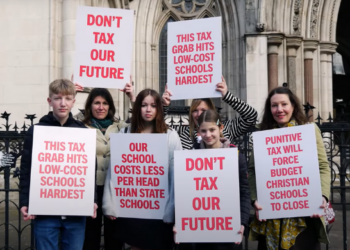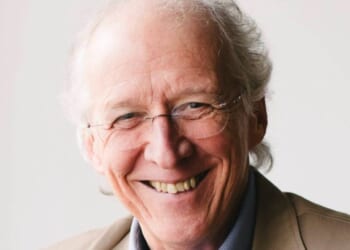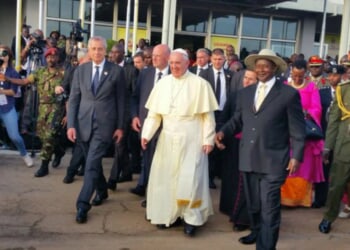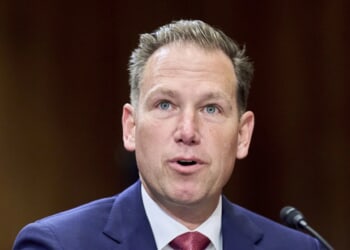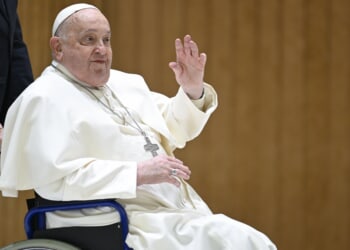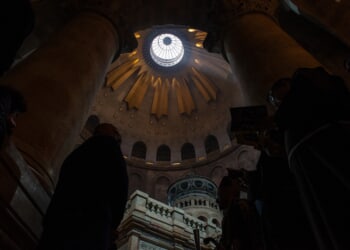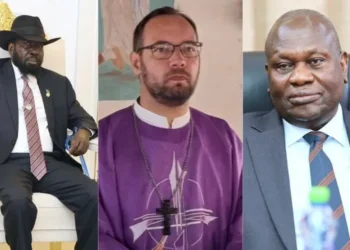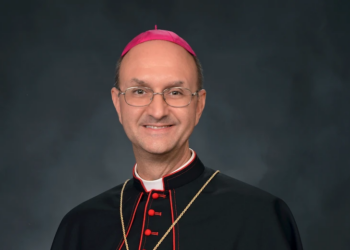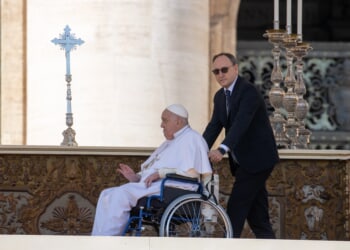Washington, D.C. Newsroom, Apr 30, 2025 /
17:43 pm
President Donald Trump passed the 100-day mark of his second presidency on Tuesday, April 29, a period that has been packed with major policy shifts, more than 130 executive orders, and over 200 lawsuits.
Trump won the country’s Catholic vote by double digits last November and since then has received praise from Catholics on several issues but skepticism and even legal challenges on others.
Actions that have received the enthusiastic endorsement of many Catholics include the administration’s initial pro-life efforts, religious liberty protections, and moves to extricate gender ideology from the government. However, the president’s embrace of in vitro fertilization (IVF), his hard-line immigration policies, and his funding cuts to nongovernmental organizations (NGOs) have caused tensions with the bishops and Catholic groups.
Pro-life victories and shortfalls
“It’s pretty clear that [Trump] has done almost everything that he could to reverse the different pro-abortion policies of the [President Joe] Biden administration,” Joseph Meaney, a past president and senior fellow of the National Catholic Bioethics Center, told CNA.
Meaney noted that Trump reinstated the Mexico City Policy, which bans funding for overseas organizations that promote abortion, and backs the Hyde Amendment, which prohibits direct federal funding for abortion. The president also announced plans to freeze millions of taxpayer dollars for Planned Parenthood, which Meaney said is used “to subsidize their abortion business.”
He added that the administration is revising agency and departmental rules and regulations that are related to abortion, and much of the Biden-era policies have been rescinded or “are going to be reversed.” This includes the last administration dropping conscience protections for health care providers on abortion-related issues, instituting rules that employers must grant leave for an employee to obtain an abortion, and the Pentagon paying workers to travel for abortions, among other pro-abortion initiatives.
Trump also directed the United States to rejoin the Geneva Consensus Declaration, which is a coalition of countries that support pro-life and pro-woman policies.
Meaney praised Trump’s decision to pardon 23 “peaceful, nonviolent pro-lifers” who were convicted of violating the Freedom of Access to Clinic Entrances (FACE) Act, adding that many people in the pro-life movement believed “there had been a policy on the part of the previous administration to go after pro-lifers in an unreasonable way.”
However, Trump’s executive order to create a plan to boost IVF access is “highly objectionable [and] problematic from a pro-life perspective,” he said. Rather than the deregulation backed by Trump, he said “there needs to be a lot more health and safety and other restrictions.”
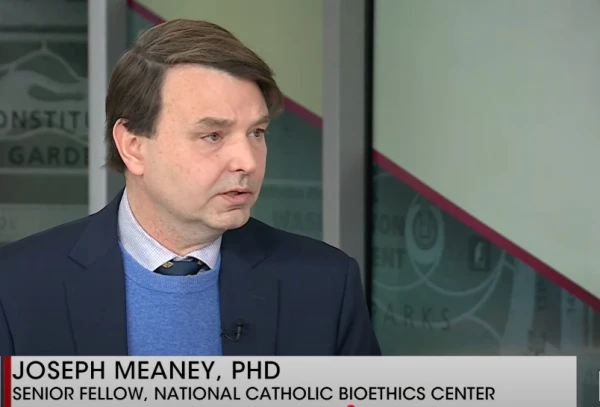
Trump also signed an executive order directing the nation’s attorney general to pursue the death penalty in federal cases, especially for murders of police officers. The United States Conference of Catholic Bishops (USCCB) criticized this order.
Moving forward, Meaney said he hopes the administration will impose regulations on the abortion pill mifepristone, which he said is “probably the No. 1 issue” currently. It was deregulated in the last two Democratic administrations, but Meaney said reimposing the original safeguards is “very, very doable” for the Trump administration.
Religious liberty, gender ideology, and education wins
On religious liberty policies, “the Trump administration has done what you would hope it would do,” Peter Breen, the head of litigation at the Thomas More Society, told CNA.
“The speed and the vigor of these efforts is 10 times the speed of the first administration,” Breen said. ”They are moving at lightning speed.”
(Story continues below)
Subscribe to our daily newsletter
Trump created the White House Faith Office and established a task force on anti-Christian bias to review and revise federal policies throughout federal departments and agencies that threaten religious liberty. This includes a Biden-era rule on “gender identity” discrimination that could have barred Catholic institutions from federal contracts, according to the USCCB.
The bishops were concerned the rule would end contracts with Catholic hospitals if they did not perform transgender surgeries on children and end contracts with foster care providers that did not place children with same-sex couples.
Another Biden-era rule sought to force Catholic hospitals to perform abortions in emergency rooms if the abortion is considered a “stabilizing treatment.”
The new office and the task force are specifically “dealing with some of the issues that we have been working on for our clients,” Breen said.
“The fact that he has so vigorously advanced the cause of religious liberty and the full inclusion of people of faith and their ministries in the government and regular life — that is a real achievement,” Breen added. “That is going to have a lasting impact.”
Moving forward, Breen said it’s important to look at “enforcement actions” to ensure officials are following through with the president’s directives to safeguard religious liberty.
In addition to Trump’s policies directly focused on religious liberty, Breen noted that federal promotion of gender ideology “has mostly come to a stop.” The president signed an executive order that defined a “woman” as an “adult human female” and rejected definitions based on a person’s “self-asserted gender identity” for the purpose of federal rules and regulations, which reversed the standard of the previous administration.
Trump further clarified Title IX protections for gender-related education policies with executive actions. Those policies prohibit biological men from participating in women’s sports and ensure that locker rooms, bathrooms, and other private facilities are separated on the basis of biological sex rather than self-asserted gender identity.
Susan Hanssen, a professor of American history at the University of Dallas (a Catholic institution), told CNA that in her estimation, Trump’s order to scale back and eventually eliminate the U.S. Department of Education is “the greatest triumph of Trump’s first 100 days in office from the point of view of Catholic social teaching.”
“Any action that will make it easier for parents to exert their authority over how their children are educated, bringing control over education down to the state and local levels, enabling charter schools, school voucher programs, etc., are fundamental to pro-family policy,” Hanssen said.
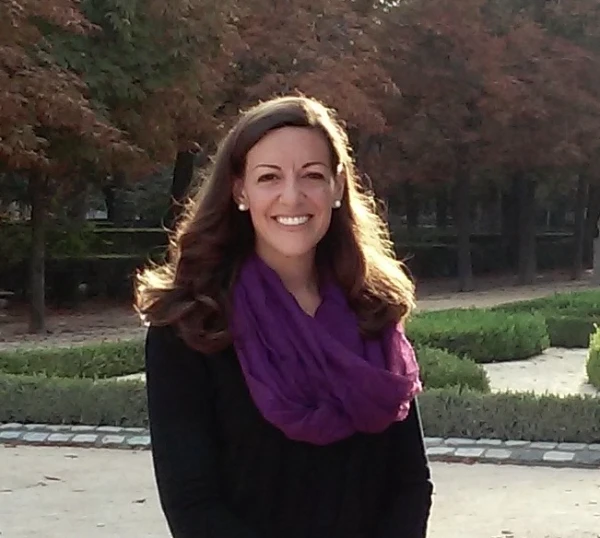
“The fact that the Department of Education has also been ideologically hijacked by progressive educational theories, the vested interests of teachers unions, LGBT ideology, and critical race theory makes it all the more urgent to liberate families to find and fund the education they want for their children,” she added.
Immigration and Catholic NGO funding tensions
Trump’s immigration policies over his first 100 days in office have created tensions with Catholic bishops, particularly over his plans to conduct mass deportations of immigrants who entered the country illegally and his actions to freeze federal funds for NGOs that resettle migrants.
In February, the USCCB sued the Trump administration after the freeze halted funds to several Catholic NGOs that received funds to provide these services. The USCCB is currently phasing out its migration programs, which were primarily funded with federal money. Catholic Charities agencies across the country cut programs and laid off employees after losing federal funding.
“For more than 100 years, the Catholic Church has consistently supported and advocated for immigrants and refugees arriving in the United States,” Julia Young, a historian and professor at The Catholic University of America, told CNA.
“The loss of funds related to refugee resettlement threatens to derail a very important element of that work,” she added. “Yet Catholic organizations and the Catholic hierarchy, which are driven by Catholic social teaching to minister to the poor and needy, will certainly continue to find ways to respond to the needs of migrants and refugees in the United States.”
Trump froze most of the country’s foreign aid funding as well, which impacted several Catholic NGOs. Catholic Relief Services (CRS) and Jesuit Refugee Service (JRS) were both forced to cut programs and lay off staff as a result.
JRS spokeswoman Bridget Cusick told CNA the freeze “had immediate negative consequences for people who have fled persecution, oppression, abuse, insecurity, discrimination, and lack of opportunity.”
“JRS was compelled to suspend operations in nine countries, including those that provided critical, lifesaving care,” Cusick said.
“Two of our programs were later reinstated, but we estimate that the changes we were forced to make impacted more than 100,000 people, including unaccompanied children,” she continued. “Thanks to the support of the Jesuit network, our board, and others, we have found ways to keep impacted programs running, but in dramatically reduced fashion, leaving thousands at risk.”
Cusick said JRS “will continue its work, but we are deeply concerned that the U.S. and indeed, other countries cutting foreign aid, seem to be trying to deny the existence of a refugee crisis, even as more than 120 million people in the world remain displaced.”
Hanssen alternatively noted that some foreign aid programs were being used to promote gender ideology and population control in other parts of the world and praised the dismantling of such programs.
USAID had become “riddled with skewed grant programs that ‘ideologically colonize’ developing countries — many of them Catholic countries in Africa and Latin America — by tying economic assistance to population control, gender ideology, and leftist political agendas,” Hanssen pointed out.
The freeze in the international funding for NGOs has also been the subject of several lawsuits.




